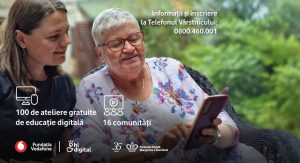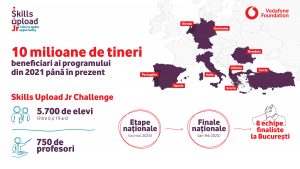- Between March 2020 and March 2021, 19,200 calls have been made to the Elderly Line social service
- The most frequent requests were those for information and material and financial support
Bucharest, April 26th, 2021 – Between March 2020 and March 2021, a period marked by the new social and sanitary conditions, the free Elderly Line recorded 19,200 interactions with beneficiaries from all across the country, with 3,982 seniors finding there the resources and solutions to the various problems they were facing.
The Elderly Line social service is the only free confidential helpline which offers solutions to the needs expressed by Romania’s elderly. The project was launched in 2015 by Margareta of Romania Royal Foundation as a response to the issue of population ageing and was financed for a total of RON 837,500 by Vodafone Romania Foundation.
In 2020, the service registered the highest number of requests and unique callers since its inception, 16,673 phone calls with 3,424 seniors. To be able to deal with the increased number of calls, the team of social workers and volunteers has been extended and they were joined by 14 volunteer psychologists since the state of emergency began. Social vouchers or help packages were distributed to over 250 elderly people who were facing material deprivation.
Out of the nearly 4,000 unique callers who dialed the Elderly Line during the pandemic, 29% live in Bucharest and 37% in rural and small urban areas. In regards to their age and living circumstances, 29% are between 70 and 80 years old and 38% live alone.
Following the analysis of available data, the most frequently expressed needs by the elderly were, in equal measure, the need for useful and up-to-date information concerning the services available in their communities and the need for material and financial support. Thus, 1,300 seniors requested information they cannot access on their own, be it because of the isolation or due to their inability to use the new communication technologies. 1,300 other elderly people requested financial and material support.
The second most frequently expressed need by the elderly was the need for care and practical support at home. For 764 callers, the helpline team provided information concerning the specialized medical assistance or supervision services, as well as references about senior homes and institutionalisation procedures.
Social isolation led to the deepening of the feeling of loneliness among the elderly, with anxiety and depression manifesting. For those facing these states and calling the Elderly Line, social workers and volunteer psychologists offered psychological counselling and emotional support. 150 seniors were registered in the weekly callback service or redirected to partner organisations.
The need for activity and social participation was expressed by 90 elderly people who called the helpline and who said they were overwhelmed with the feeling of uselessness following their retirement and loss of a social role. For these, the Elderly Line suggested community volunteering activities, relating and socialising by participating in clubs and programmes for seniors. The “Generații” Community Centre, the Centre for Seniors of Bucharest, the “Niciodată Singur” Association are some of the programmes which have adapted their activities to the online environment to keep being there for seniors.
A new type of request which appeared in the context of the pandemic crisis was shopping for food, medicine and hygienic and sanitary products, solved thanks to sponsorships and the development of partnerships.
The Elderly Line is more than necessary in a society characterised by an acute lack of social services, public or private, meant for elderly people, offering a concrete support to seniors in precarious living circumstances.
The service is free, available to take calls Monday to Friday between 8 am and 8 pm and Saturday between 8 am and 4 pm at 0800 460 001.
The Romanian National Lottery Company and S.C. Johnson Wax joined as sponsors for this project.

About the Margareta of Romania Royal Foundation
Established in 1990, by Her Majesty Margareta, Custodian of the Romanian Crown, together with her father, King Mihai, the Margareta of Romania Royal Foundation is today an elite non-governmental organization which supports children, youth and the elderly through long-lasting interventions, based on the exchange of experience and values between generations. During its 30 years of activity, the Foundation developed numerous durable projects in the fields of education, community development, civil society, health and culture, projects which contributed to the spiritual and social renewal of Romania. The Margareta of Romania Royal Foundation works to support the elderly through programmes aimed to increase their quality of life, by involving volunteers and mobilizing institutional partners and the whole community.More details on www.frmr.ro.
About Vodafone Romania Foundation
The Vodafone Romania Foundation is a Romanian nongovernmental charitable organisation, established in 1998, which operates separately and independently from the company’s business. In over 20 years of activity, Vodafone Romania Foundation has funded 1,168 programs conducted by 745 non-governmental organizations across the country, in the health, education, social services industry. These projects had more than 3 million beneficiaries – children, young and old people, physically, socially, or economically disadvantaged people. So far, Vodafone Romania Foundation invested EUR 31 million in projects conducted by partner non-profit organizations. More details about the foundation’s programs are available at www.fundatia-vodafone.ro, http://jurnaldebine.fundatiavodafone.ro/ and www.facebook.com/fundatiavodafone.




